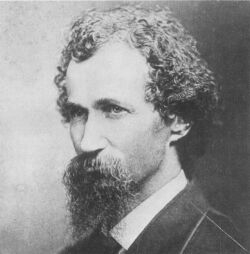Analysis of Ned the Larrikin
Henry Kendall 1839 (Australia) – 1882 (Sydney)
A SONG that is bitter with grief—a ballad as pale as the light
That comes with the fall of the leaf, I sing to the shadows to-night.
The laugh on the lyrical lips is sadder than laughter of ghosts
Chained back in the pits of eclipse by wailing unnameable coasts.
I gathered this wreath at the close of day that was dripping with dew;
The blossom you take for a rose was plucked from the branch of a yew.
The flower you fancy is sweet has black in the place of the red;
For this is a song of the street—the ballad of larrikin Ned.
He stands at the door of the sink that gapes like a fissure of death:
The face of him fiery with drink, the flame of its fume in his breath.
He thrives in the sickening scenes that the devil has under his ban;
A rascal not out of his teens with the voice of a vicious old man.
A blossom of blackness, indeed—of Satan a sinister fruit!
Far better the centipede’s seed—the spawn of the adder or newt.
Than terror of talon or fang this imp of the alleys is worse:
His speech is a poisonous slang—his phrases are coloured with curse.
The prison, the shackles, and chain are nothing to him and his type:
He sings in the shadow of pain, and laughs at the impotent stripe.
There under the walls of the gaols the half of his life has been passed.
He was born in the bosom of bale—he will go to the gallows at last.
No angel in Paradise kneels for him at the feet of the Lord;
A Nemesis follows his heels in the flame of a sinister sword.
The sins of his fathers have brought this bitterness into his days—
His life is accounted as naught; his soul is a brand for the blaze.
Did ever his countenance change? Did ever a moment supreme
Illumine his face with a strange ineffably beautiful dream?
Before he was caught in the breach—in the pits of iniquity grim,
Did ever the Deity reach the hand of a Father to him?
Behold, it is folly to say the evil was born in the blood;
The rose that is cankered to-day was once an immaculate bud!
There might have been blossom and fruit—a harvest exceedingly fair,
Instead of the venomous root, and flowers that startle and scare.
The burden—the burden is their’s who, watching this garden about,
Assisted the thistle and tares, and stamped the divinity out!
A growth like the larrikin Ned—a brutal unqualified clod,
Is what ye are helping who’d tread on the necks of the prophets of God.
No more than a damnable weed ye water and foster, ye fools,
Whose aim is to banish indeed the beautiful Christ from the schools.
The merciful, wonderful light of the seraph Religion behold
These evil ones shut from the sight of the children who weep in the cold!
But verily trouble shall fall on such, and their portion shall be
A harvest of hyssop and gall, and sorrow as wild as the sea.
For the rose of a radiant star is over the hills of the East,
And the fathers are heartened for war—the prophet, the Saint, and the priest.
For a spirit of Deity makes the holy heirophants strong;
And a morning of majesty breaks, and blossoms in colour and song.
Yea, now, by the altars august the elders are shining supreme;
And brittle and barren as dust is the spiritless secular dream.
It’s life as a vapour shall end as a fog in the fall of the year;
For the Lord is a Father and Friend, and the day of His coming is near.
| Scheme | AA BB CC DD EE FF GG HH II JJ KK LL MM NN OO PP QQ AX RR SS TT UU VV MM WW |
|---|---|
| Poetic Form | |
| Metre | 0111101101011101 111011011110111 0110100111011011 1100110111011 1101110111111011 0101110111101101 0101101111001101 11101101010111 1110110111101011 01111001101111011 11001001101011011 01011111101101011 0101100111001001 11001101101011 1101101111101011 1110100111011011 0100100111011011 110011101101001 1100110101111111 111001011111101011 110010111101101 01001011001101001 0111101111000111 1110101111101101 1101100111001001 11110111001 01111001001101001 1100100101101011 0111101101011001 011111111101001 1111100101001001 0110100101011001 0100101111011001 0100100101001001 0110110100101 11111011101101011 11101111001011 1111100101001101 0100100110101001 11011101101011001 11101111011011 0101100101011101 10110100111001101 00101101101001001 10101100101011 0010110010100101 1110101001011001 010010111011001 1110111101001101 101101001001111011 |
| Closest metre | Iambic octameter |
| Characters | 3,254 |
| Words | 624 |
| Sentences | 29 |
| Stanzas | 25 |
| Stanza Lengths | 2, 2, 2, 2, 2, 2, 2, 2, 2, 2, 2, 2, 2, 2, 2, 2, 2, 2, 2, 2, 2, 2, 2, 2, 2 |
| Lines Amount | 50 |
| Letters per line (avg) | 51 |
| Words per line (avg) | 12 |
| Letters per stanza (avg) | 102 |
| Words per stanza (avg) | 25 |
Font size:
Submitted on May 13, 2011
Modified on March 05, 2023
- 3:07 min read
- 104 Views
Citation
Use the citation below to add this poem analysis to your bibliography:
Style:MLAChicagoAPA
"Ned the Larrikin" Poetry.com. STANDS4 LLC, 2024. Web. 1 May 2024. <https://www.poetry.com/poem-analysis/17538/ned-the-larrikin>.


Discuss this Henry Kendall poem analysis with the community:
Report Comment
We're doing our best to make sure our content is useful, accurate and safe.
If by any chance you spot an inappropriate comment while navigating through our website please use this form to let us know, and we'll take care of it shortly.
Attachment
You need to be logged in to favorite.
Log In